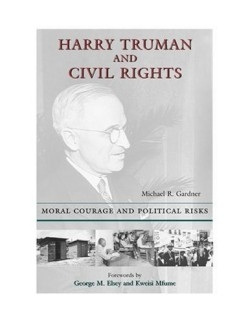Harry Truman and Civil Rights
Moral Courage and Political Risks
Former President Harry Truman as a civil rights advocate because it was the right—not politically expedient—position for America after World War II. He initially supported civil rights because he was repulsed by the treatment received by the 780,000 returning African-American World War I veterans. Former Captain Truman was appalled as “victorious veterans of color…often returned home to be greeted by cowardly men in white sheets.” This is the compelling argument presented by the author, a communications policy attorney and a member of commissions created by Presidents Nixon, Ford, Reagan, and Bush.
During Truman’s presidency there was no groundswell for federally supported civil rights—a poll once revealed an 82% disapproval rate. He realized that civil rights legislation was doomed in Congress, whether the majority was Democrat or Republican, because a stagnant, racist bloc of states’-rights Republicans and Southern Democrats controlled the legislative branch. Truman wisely relied on executive orders and the Supreme Court, presided over by Chief Justice Fred Vinson, to promote the civil rights that Congress wouldn’t. The president delivered impassioned speeches in Harlem, at the Lincoln Memorial, and at Howard University to increase public support for his ten- point civil rights program.
Truman first appointed a multiracial committee in 1946 to recommend legislation. The committee’s report, To Secure These Rights, jolted the nation with its reports of lynching and of voting and employment opportunities denied to African-Americans. Two years later, the president issued Executive Orders 9980 and 9981, which created new careers for African-Americans by desegregating the federal work force and the armed forces. These landmark actions were matched by important decisions of the Vinson Court, ending restrictive real estate covenants, eliminating segregation in interstate travel, and stopping segregation in state-supported higher education. These rulings established the precedent for the Warren Court to strike down school segregation in Brown v. Board of Education in 1954. The sweeping civil rights legislation of the 1960s was inspired by Truman’s proposals, made sixteen years before the 1964 Civil Rights Act.
Mordecai Johnson, the distinguished president of Howard University, and Carl Rowan, the noted journalist who covered the civil rights movement for more than fifty years, were only two of many African-American leaders who lauded “Mr. Civil Rights” as the most progressive president since Lincoln. Harry Truman—the lifelong civil rights activist—cared for and was admired by not only the common citizens but also the forgotten ones.
Reviewed by
Karl Helicher
Disclosure: This article is not an endorsement, but a review. The publisher of this book provided free copies of the book to have their book reviewed by a professional reviewer. No fee was paid by the publisher for this review. Foreword Reviews only recommends books that we love. Foreword Magazine, Inc. is disclosing this in accordance with the Federal Trade Commission’s 16 CFR, Part 255.

